Schmitt C.B. (ed.) The Cambridge History of Renaissance Philosophy
Подождите немного. Документ загружается.

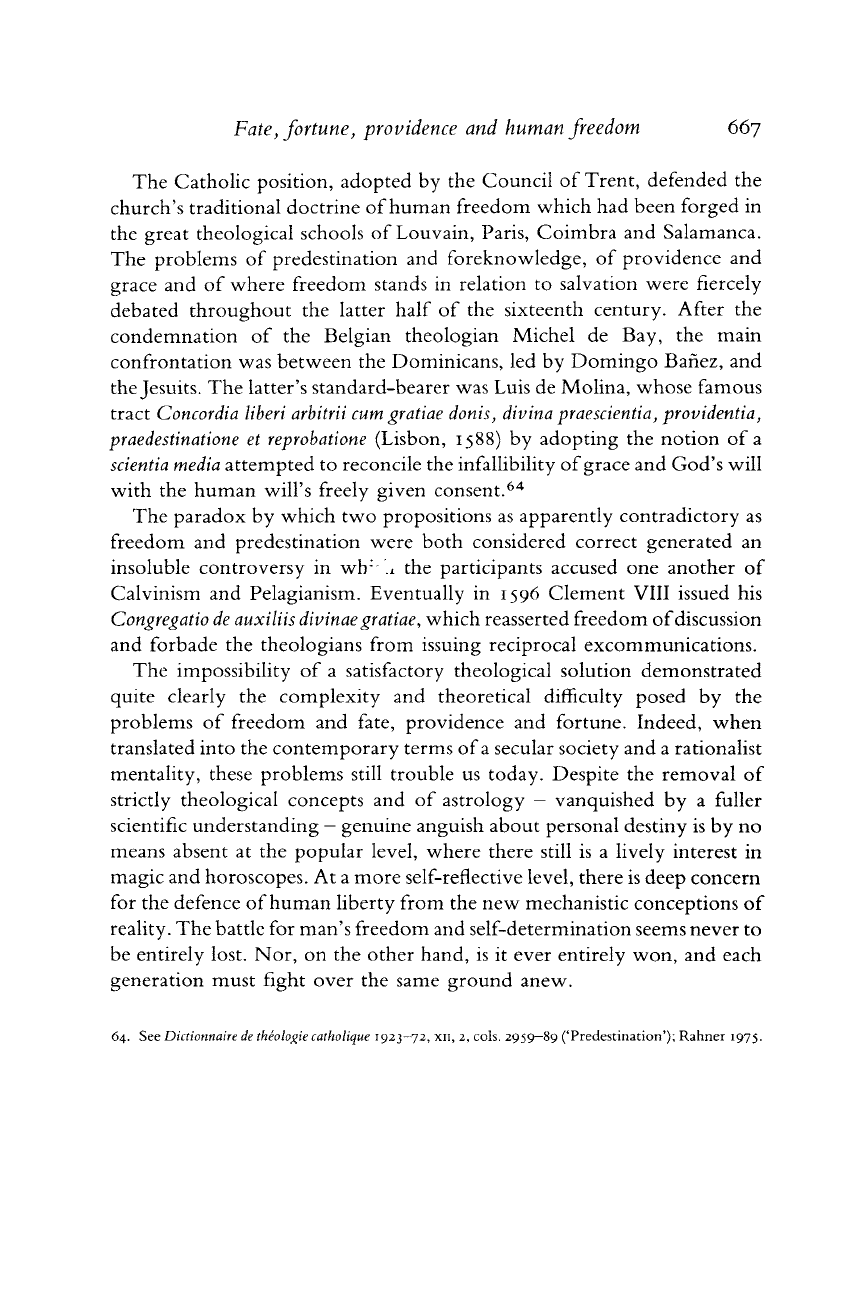
Fate,
fortune, providence and
human
freedom
667
The
Catholic position, adopted by the Council of Trent, defended the
church's traditional doctrine of human freedom which had been forged in
the great theological schools of Louvain, Paris, Coimbra and Salamanca.
The
problems of predestination and foreknowledge, of providence and
grace
and of where freedom
stands
in relation to salvation were fiercely
debated throughout the
latter
half of the sixteenth century.
After
the
condemnation of the Belgian theologian Michel de Bay, the main
confrontation was between the Dominicans, led by Domingo
Banez,
and
the Jesuits. The
latter's
standard-bearer
was Luis de Molina, whose famous
tract
Concordia liberi arbitrii cum gratiae donis, divina praescientia, providentia,
praedestinatione et reprobatione (Lisbon, 1588) by adopting the notion of a
scientia media attempted to reconcile the infallibility
of
grace
and God's
will
with
the human
will's
freely
given
consent.
64
The
paradox by which two propositions as apparently contradictory as
freedom and predestination were both considered correct generated an
insoluble controversy in wb
:
^ the participants accused one
another
of
Calvinism
and Pelagianism. Eventually in 1596 Clement
VIII
issued his
Congregatio de auxiliis divinae gratiae, which reasserted freedom
of
discussion
and forbade the theologians from issuing reciprocal excommunications.
The
impossibility of a satisfactory theological solution demonstrated
quite clearly the complexity and theoretical difficulty posed by the
problems of freedom and fate, providence and fortune. Indeed, when
translated into the contemporary
terms
of a secular society and a rationalist
mentality, these problems still trouble us today. Despite the removal of
strictly theological concepts and of astrology — vanquished by a fuller
scientific
understanding - genuine anguish about personal destiny is by no
means absent at the popular
level,
where
there
still is a
lively
interest in
magic
and horoscopes. At a more self-reflective
level,
there
is deep concern
for
the defence
of
human liberty from the new mechanistic conceptions of
reality. The battle for man's freedom and self-determination seems never to
be entirely lost. Nor, on the other
hand,
is it ever entirely won, and each
generation must fight over the same ground anew.
64. See Dictionnaire de théologie catholique
1923—72,
xn, 2,
cols.
2959—89
('Predestination');
Rahner
1975.
Cambridge Histories Online © Cambridge University Press, 2008
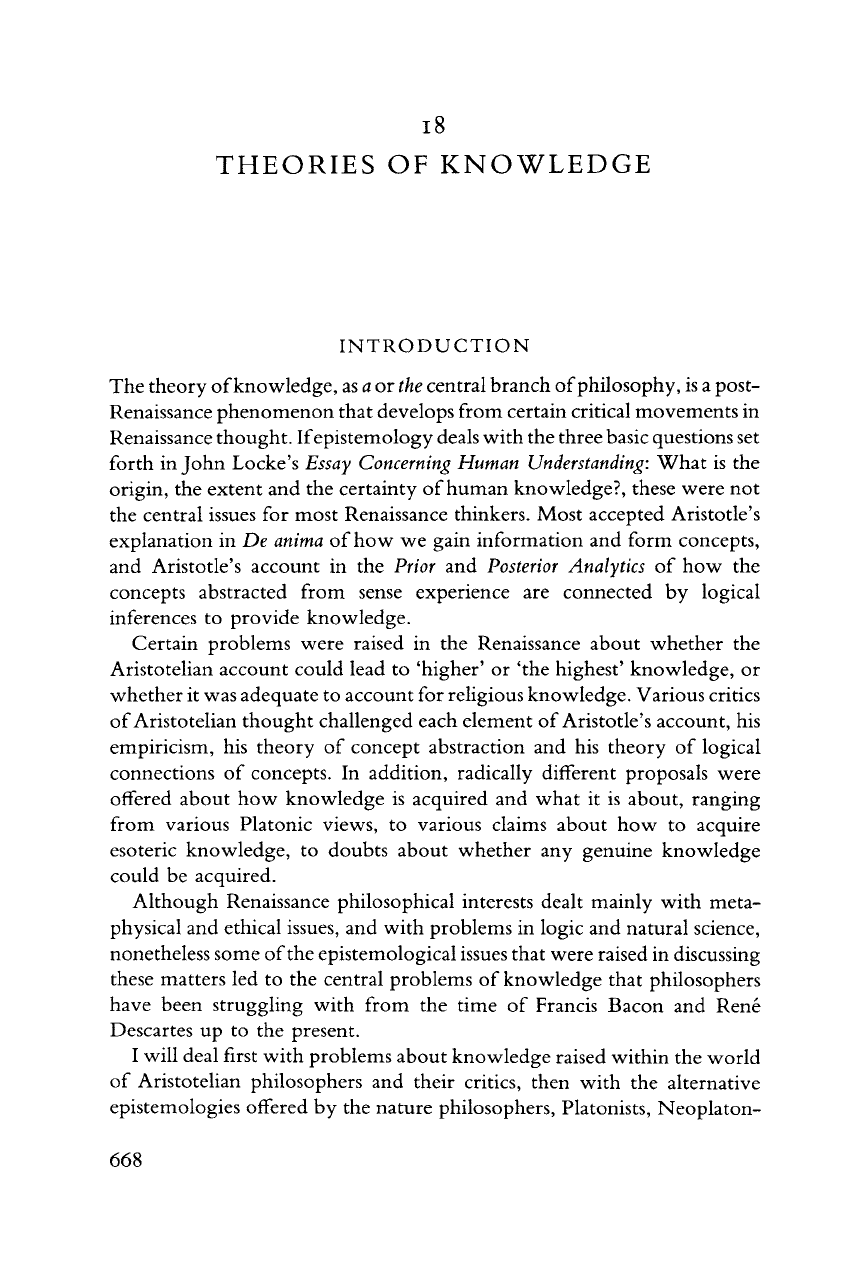
i8
INTRODUCTION
The
theory
of
knowledge,
as a or the central branch
of
philosophy, is a post-
Renaissance phenomenon
that
develops from certain critical movements in
Renaissance thought.
If
epistemology
deals with the
three
basic questions set
forth in
John
Locke's
Essay Concerning
Human
Understanding: What is the
origin, the extent and the certainty of human knowledge?, these were not
the central issues for most Renaissance thinkers. Most accepted Aristotle's
explanation in De
anima
of how we gain information and form concepts,
and Aristotle's account in the Prior and Posterior Analytics of how the
concepts abstracted from sense experience are connected by
logical
inferences to provide knowledge.
Certain problems were raised in the Renaissance about whether the
Aristotelian account could lead to 'higher' or 'the highest' knowledge, or
whether it was adequate to account for religious knowledge. Various critics
of
Aristotelian thought challenged each element of Aristotle's account, his
empiricism, his theory of concept abstraction and his theory of
logical
connections of concepts. In addition, radically different proposals were
offered
about how knowledge is acquired and what it is about, ranging
from various Platonic
views,
to various claims about how to acquire
esoteric knowledge, to doubts about whether any genuine knowledge
could
be acquired.
Although
Renaissance philosophical interests dealt mainly with meta-
physical
and ethical issues, and with problems in
logic
and
natural
science,
nonetheless some
of
the epistemological issues
that
were raised in discussing
these
matters
led to the central problems of knowledge
that
philosophers
have been struggling with from the time of Francis Bacon and Rene
Descartes up to the present.
I
will
deal first with problems about knowledge raised within the world
of
Aristotelian philosophers and their critics,
then
with the alternative
epistemologies offered by the
nature
philosophers, Platonists, Neoplaton-
668
THEORIES
OF
KNOWLEDGE
Cambridge Histories Online © Cambridge University Press, 2008
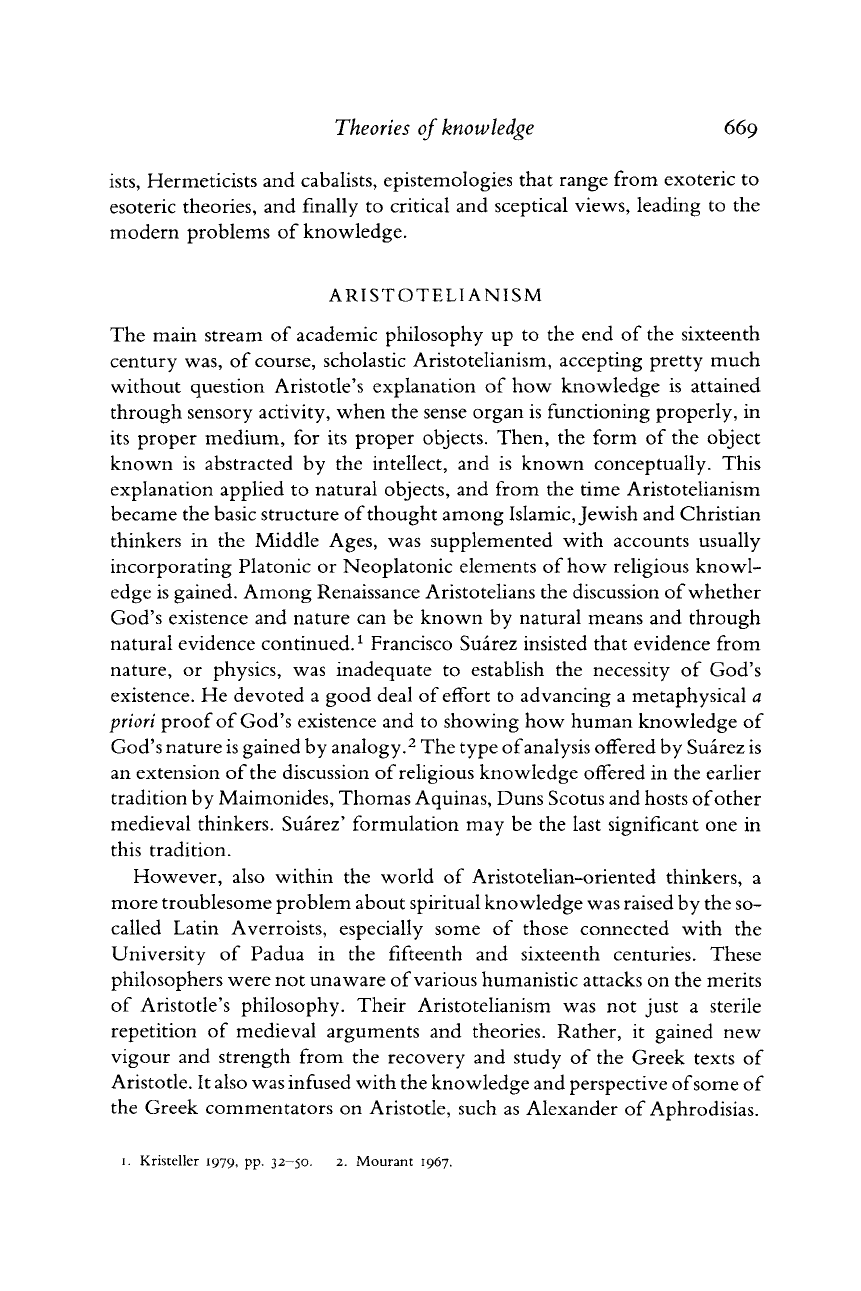
Theories of knowledge
669
ists, Hermeticists and cabalists, epistemologies
that
range from exoteric to
esoteric theories, and finally to critical and sceptical
views,
leading to the
modern problems of knowledge.
ARISTOTELIANISM
The
main stream of academic philosophy up to the end of the sixteenth
century was, of course, scholastic Aristotelianism, accepting pretty much
without question Aristotle's explanation of how knowledge is attained
through sensory activity, when the sense organ is functioning properly, in
its proper medium, for its proper objects. Then, the form of the object
known is abstracted by the intellect, and is known conceptually. This
explanation applied to
natural
objects, and from the time Aristotelianism
became the basic
structure
of
thought among Islamic, Jewish and Christian
thinkers in the Middle
Ages,
was supplemented with accounts usually
incorporating Platonic or Neoplatonic elements of how religious knowl-
edge
is gained. Among Renaissance Aristotelians the discussion of whether
God's
existence and
nature
can be known by
natural
means and through
natural
evidence continued.
1
Francisco Suarez insisted
that
evidence from
nature,
or physics, was inadequate to establish the necessity of God's
existence.
He devoted a good deal of effort to advancing a metaphysical a
priori proof of God's existence and to showing how human knowledge of
God's
nature
is gained by analogy.
2
The type
of
analysis offered by Suarez is
an extension of the discussion of religious knowledge offered in the earlier
tradition by Maimonides, Thomas Aquinas, Duns Scotus and hosts
of
other
medieval
thinkers. Suarez' formulation may be the last significant one in
this tradition.
However,
also within the world of Aristotelian-oriented thinkers, a
more troublesome problem about spiritual knowledge was raised by the so-
called
Latin Averroists, especially some of those connected with the
University
of Padua in the fifteenth and sixteenth centuries. These
philosophers were not unaware
of
various humanistic attacks on the merits
of
Aristotle's philosophy. Their Aristotelianism was not just a sterile
repetition of medieval arguments and theories. Rather, it gained new
vigour
and strength from the recovery and study of the Greek texts of
Aristotle.
It also was infused with the knowledge and perspective
of
some of
the Greek commentators on Aristotle, such as Alexander of Aphrodisias.
1.
Kristeller
1979, PP-
32-50.
2.
Mourant
1967.
Cambridge Histories Online © Cambridge University Press, 2008
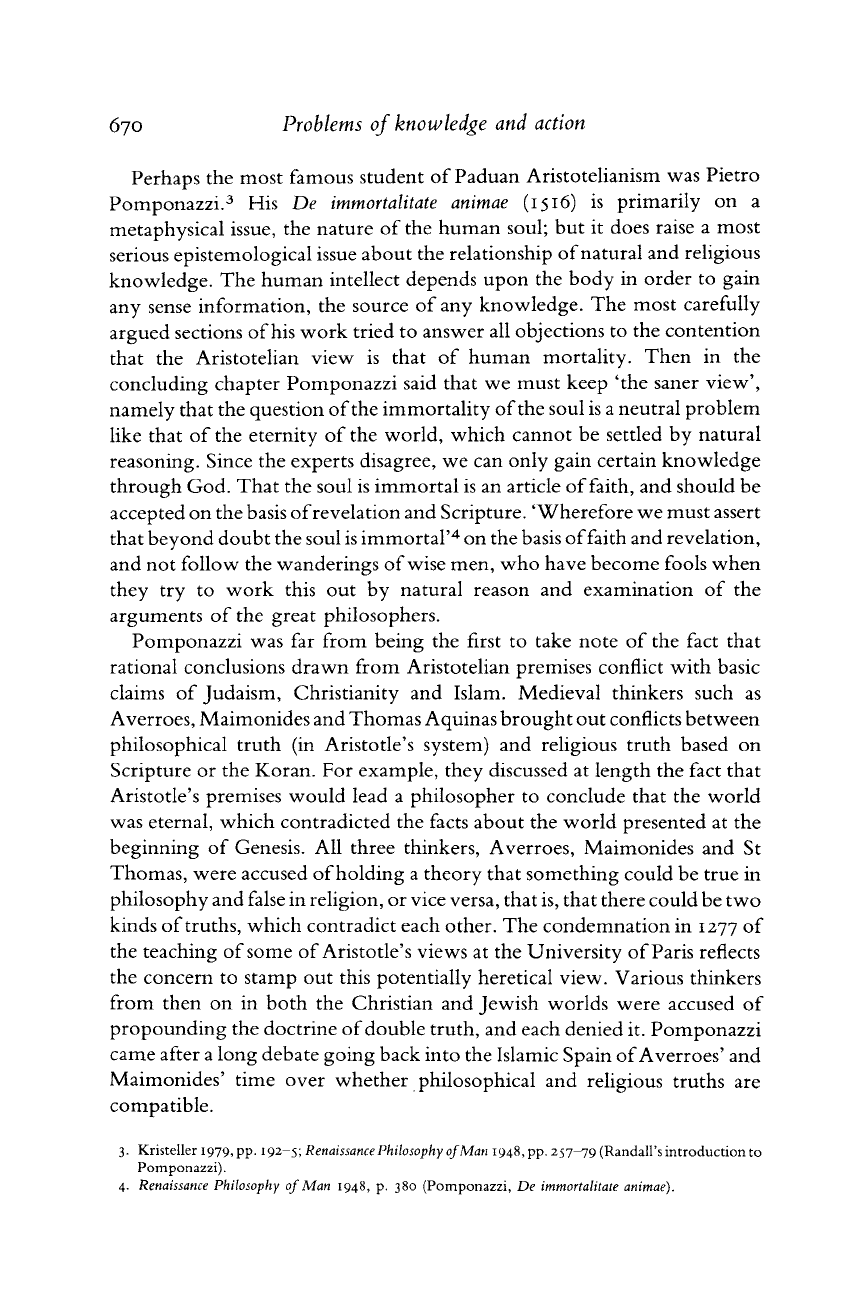
670
Problems of knowledge and action
Perhaps the most famous student of Paduan Aristotelianism was Pietro
Pomponazzi.
3
His De immortalitate animae
(1516)
is primarily on a
metaphysical issue, the
nature
of the human soul; but it does raise a most
serious epistemological issue about the relationship
of
natural and religious
knowledge.
The human intellect depends upon the body in order to gain
any sense information, the source of any knowledge. The most carefully
argued sections
of
his work tried to answer all objections to the contention
that
the Aristotelian
view
is
that
of human mortality. Then in the
concluding chapter Pomponazzi said
that
we must keep 'the saner
view',
namely
that
the question
of
the immortality
of
the soul is a neutral problem
like
that
of the eternity of the world, which cannot be settled by natural
reasoning. Since the experts disagree, we can only gain certain knowledge
through God. That the soul is immortal is an article
of
faith, and should be
accepted on the basis
of
revelation and Scripture. 'Wherefore we must assert
that
beyond doubt the soul is immortal'
4
on the basis
of
faith and revelation,
and not
follow
the wanderings
of
wise
men, who have become
fools
when
they try to work this out by natural reason and examination of the
arguments of the great philosophers.
Pomponazzi was far from being the first to take note of the fact
that
rational conclusions drawn from Aristotelian premises conflict with basic
claims
of Judaism, Christianity and Islam. Medieval thinkers such as
Averroes,
Maimonides and Thomas Aquinas brought out conflicts between
philosophical
truth
(in Aristotle's system) and religious
truth
based on
Scripture or the Koran. For example, they discussed at length the fact
that
Aristotle's
premises would lead a philosopher to conclude
that
the world
was
eternal, which contradicted the facts about the world presented at the
beginning of Genesis. All
three
thinkers, Averroes, Maimonides and St
Thomas,
were accused
of
holding a theory
that
something could be
true
in
philosophy and false in religion, or
vice
versa,
that
is,
that
there
could be two
kinds
of
truths,
which contradict each other. The condemnation in 1277 of
the teaching of some of Aristotle's
views
at the University of Paris reflects
the concern to stamp out this potentially heretical
view.
Various thinkers
from then on in both the Christian and Jewish worlds were accused of
propounding the doctrine
of
double
truth,
and each denied it. Pomponazzi
came after a long debate going back into the Islamic Spain
of
Averroes'
and
Maimonides' time over whether philosophical and religious
truths
are
compatible.
3.
Kristeller
1979, pp.
192-5;
Renaissance Philosophy
of
Man 1948, pp.
257-79
(Randall's
introduction
to
Pomponazzi).
4. Renaissance Philosophy of Man 1948, p. 380
(Pomponazzi,
De
immortalitate
animae).
Cambridge Histories Online © Cambridge University Press, 2008
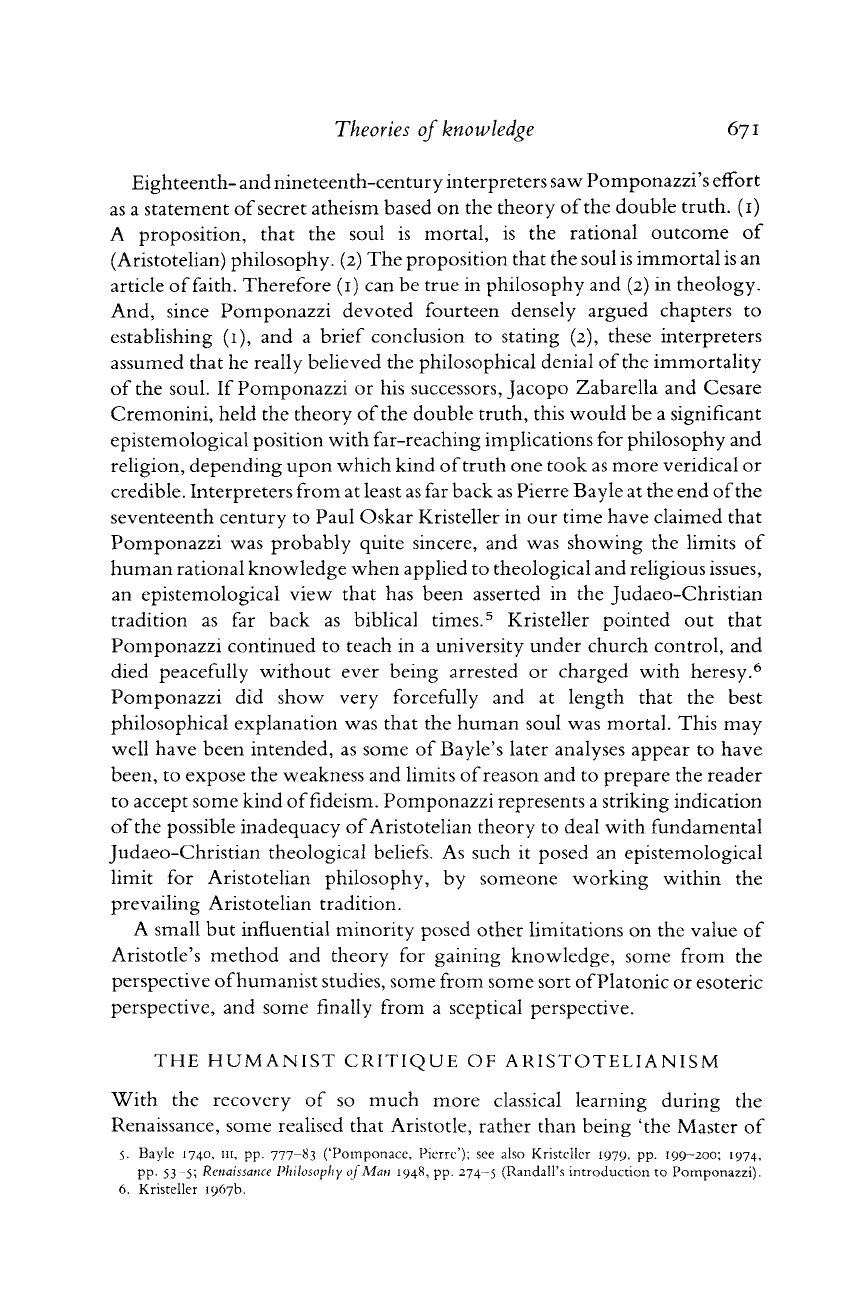
Theories of knowledge
671
Eighteenth- and nineteenth-century
interpreters
saw Pomponazzi's effort
as a statement
of
secret atheism based on the theory
of
the double
truth.
(1)
A
proposition,
that
the soul is mortal, is the rational outcome of
(Aristotelian) philosophy. (2) The proposition
that
the soul is immortal is an
article
of
faith. Therefore (1) can be
true
in philosophy and (2) in theology.
And,
since Pomponazzi devoted fourteen densely argued chapters to
establishing (1), and a brief conclusion to stating (2), these
interpreters
assumed
that
he really believed the philosophical denial of the immortality
of
the soul. If Pomponazzi or his successors, Jacopo Zabarella and Cesare
Cremonini, held the theory of the double
truth,
this would be a significant
epistemological
position with far-reaching implications for philosophy and
religion,
depending upon which kind
of
truth
one took as more veridical or
credible.
Interpreters
from at least as far back as Pierre
Bayle
at the end
of
the
seventeenth century to Paul Oskar Kristeller in our time have claimed
that
Pomponazzi was probably quite sincere, and was showing the limits of
human rational knowledge when applied to theological and religious issues,
an epistemological
view
that
has been asserted in the Judaeo-Christian
tradition as far back as biblical times.
5
Kristeller pointed out
that
Pomponazzi continued to teach in a university
under
church control, and
died peacefully without ever being arrested or charged with heresy.
6
Pomponazzi did show very forcefully and at length
that
the best
philosophical explanation was
that
the human soul was mortal. This may
well
have been intended, as some of
Bayle's
later analyses appear to have
been, to expose the weakness and limits
of
reason and to
prepare
the reader
to accept some kind
of
fideism.
Pomponazzi represents a striking indication
of
the possible inadequacy of Aristotelian theory to deal with fundamental
Judaeo-Christian theological
beliefs.
As such it posed an epistemological
limit for Aristotelian philosophy, by someone working within the
prevailing Aristotelian tradition.
A
small but influential minority posed other limitations on the value of
Aristotle's
method and theory for gaining knowledge, some from the
perspective
of
humanist studies, some from some sort
of
Platonic or esoteric
perspective, and some finally from a sceptical perspective.
THE
HUMANIST
CRITIQUE
OF
ARISTOTELIANISM
With
the recovery of so much more classical learning during the
Renaissance, some realised
that
Aristotle,
rather
than
being 'the Master of
5.
Bayle
1740, in, pp.
777-83
('Pomponace,
Pierre');
see
also
Kristeller
1979, pp.
199—200;
1974,
PP- 53-5; Renaissance Philosophy of Man 1948, pp.
274-5 (Randall's
introduction
to
Pomponazzi).
6.
Kristeller
1967b.
Cambridge Histories Online © Cambridge University Press, 2008
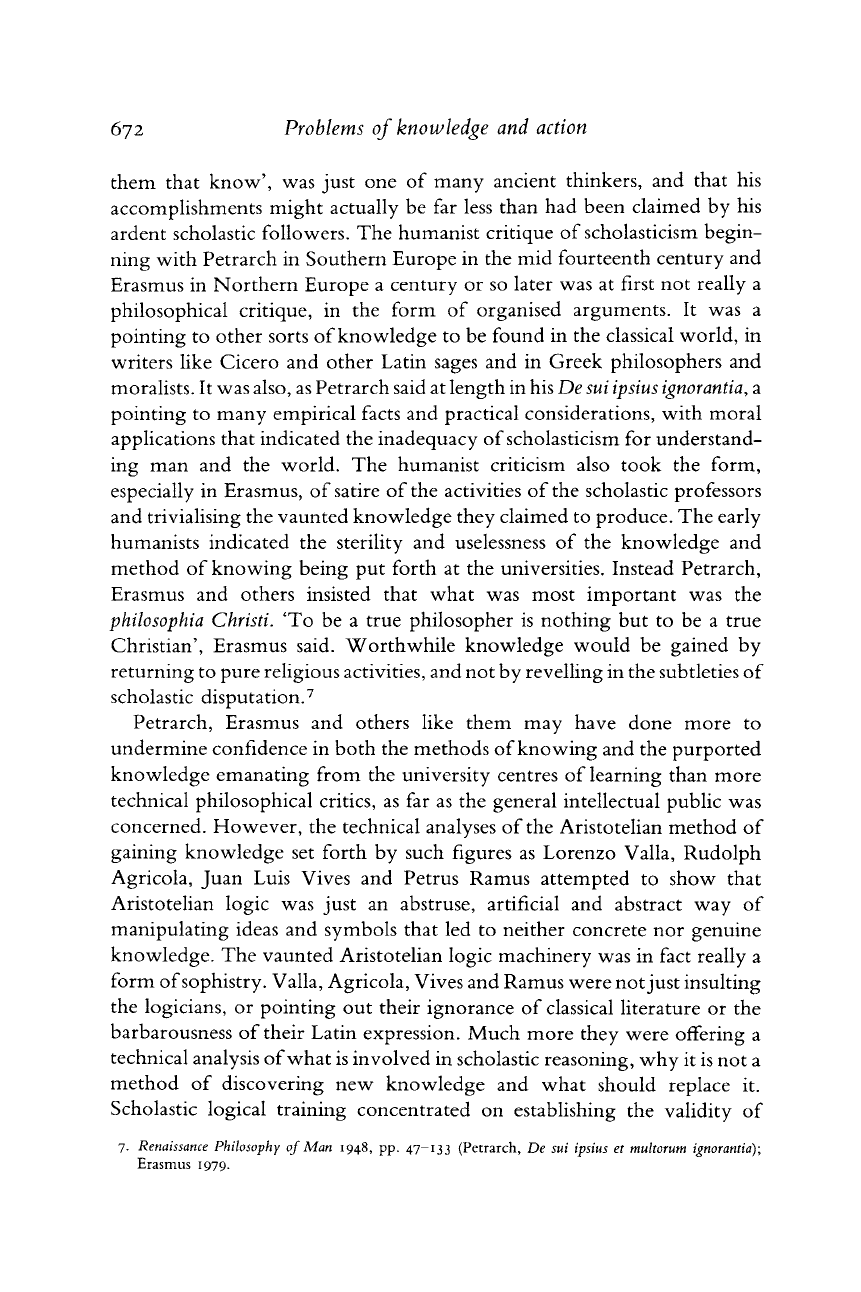
6j2
Problems of knowledge and action
them
that
know', was just one of many ancient thinkers, and
that
his
accomplishments might actually be far less
than
had been claimed by his
ardent
scholastic
followers.
The humanist critique of scholasticism begin-
ning with Petrarch in Southern Europe in the mid fourteenth century and
Erasmus in Northern Europe a century or so later was at first not really a
philosophical critique, in the form of organised arguments. It was a
pointing to other sorts of knowledge to be found in the classical world, in
writers like
Cicero
and other Latin sages and in Greek philosophers and
moralists. It was also, as Petrarch said at length in his De sui ipsius ignorantia, a
pointing to many empirical facts and practical considerations, with moral
applications
that
indicated the inadequacy of scholasticism for
understand-
ing
man and the world. The humanist criticism also took the form,
especially
in Erasmus, of satire of the activities of the scholastic professors
and trivialising the vaunted knowledge they claimed to produce. The early
humanists indicated the sterility and uselessness of the knowledge and
method of knowing being put forth at the universities. Instead Petrarch,
Erasmus and others insisted
that
what was most
important
was the
philosophia Christi. 'To be a
true
philosopher is nothing but to be a
true
Christian', Erasmus said. Worthwhile knowledge would be gained by
returning
to
pure
religious activities, and not by revelling in the subtleties of
scholastic disputation.
7
Petrarch, Erasmus and others like them may have done more to
undermine confidence in both the methods
of
knowing
and the
purported
knowledge
emanating from the university centres of learning
than
more
technical philosophical critics, as far as the general intellectual public was
concerned. However, the technical analyses of the Aristotelian method of
gaining knowledge set forth by such figures as Lorenzo
Valla,
Rudolph
Agricola,
Juan
Luis
Vives
and Petrus Ramus attempted to show
that
Aristotelian
logic
was just an abstruse, artificial and abstract way of
manipulating ideas and symbols
that
led to neither concrete nor genuine
knowledge.
The vaunted Aristotelian
logic
machinery was in fact really a
form
of
sophistry.
Valla,
Agricola,
Vives
and Ramus were not just insulting
the logicians, or pointing out their ignorance of classical
literature
or the
barbarousness of their Latin expression. Much more they were offering a
technical analysis
of
what is involved in scholastic reasoning, why it is not a
method of discovering new knowledge and what should replace it.
Scholastic
logical
training concentrated on establishing the validity of
7. Renaissance Philosophy of Man 1948, pp.
47-133
(Petrarch,
De sui ipsius et
multorum
ignorantia);
Erasmus
1979.
Cambridge Histories Online © Cambridge University Press, 2008
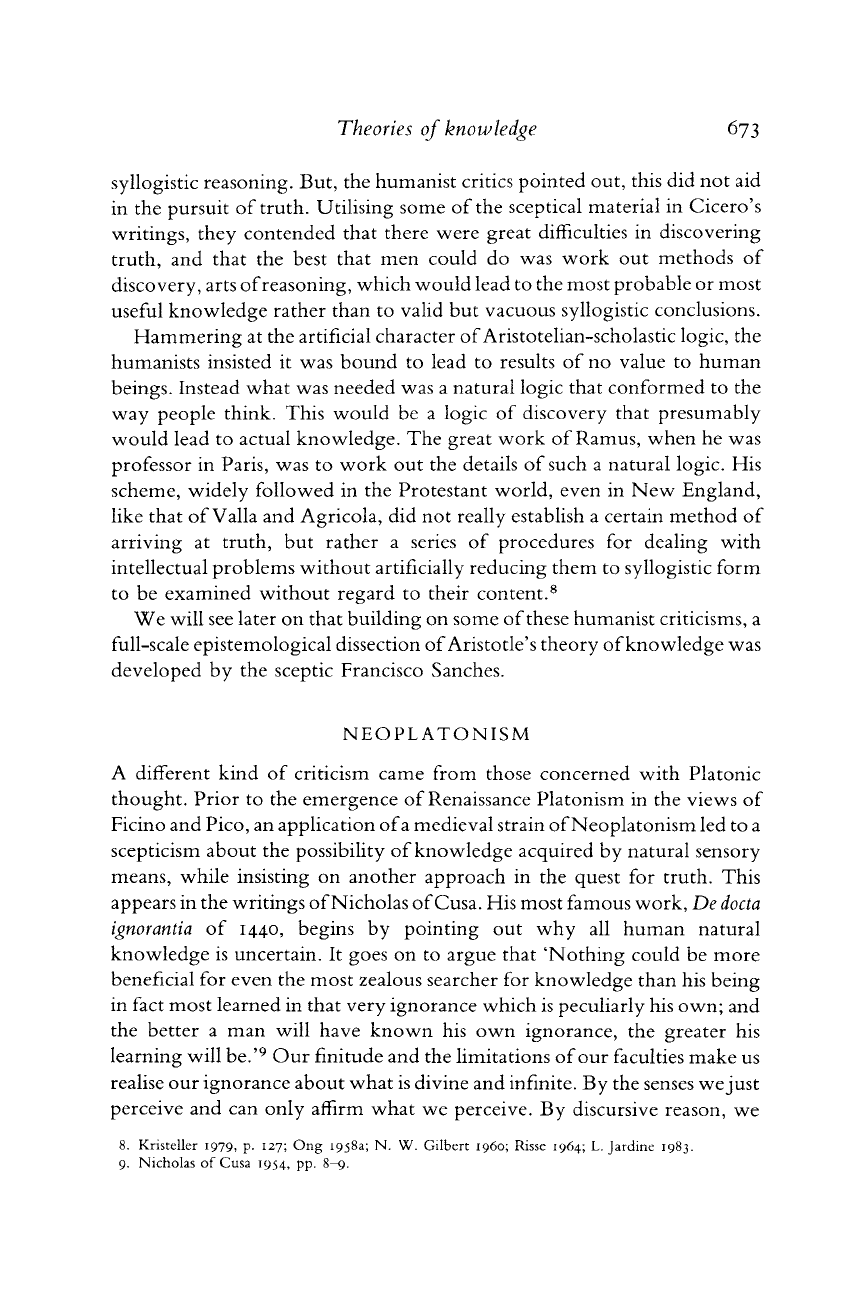
Theories
of knowledge
syllogistic
reasoning. But, the humanist critics pointed out, this did not aid
in the pursuit of
truth.
Utilising some of the sceptical material in Cicero's
writings,
they contended
that
there
were great difficulties in discovering
truth,
and
that
the best
that
men could do was work out methods of
discovery,
arts
of
reasoning, which would lead to the most probable or most
useful
knowledge
rather
than
to valid but vacuous syllogistic conclusions.
Hammering at the artificial character
of
Aristotelian-scholastic
logic,
the
humanists insisted it was bound to lead to results of no value to human
beings.
Instead what was needed was a natural logic
that
conformed to the
way
people think. This would be a logic of discovery
that
presumably
would
lead to actual knowledge. The great work of Ramus, when he was
professor in Paris, was to work out the details of such a natural
logic.
His
scheme,
widely followed in the Protestant world, even in New England,
like
that
of
Valla
and
Agricola,
did not really establish a certain method of
arriving at
truth,
but
rather
a series of procedures for dealing with
intellectual problems without artificially reducing them to syllogistic form
to be examined without regard to their content.
8
We
will
see later on
that
building on some
of
these humanist criticisms, a
full-scale
epistemological dissection
of
Aristotle's
theory
of
knowledge
was
developed
by the sceptic Francisco Sanches.
NEOPLATONISM
A
different kind of criticism came from those concerned with Platonic
thought. Prior to the emergence of Renaissance Platonism in the
views
of
Ficino
and
Pico,
an application
of
a medieval strain
of
Neoplatonism led to a
scepticism
about the possibility of knowledge acquired by natural sensory
means, while insisting on another approach in the quest for
truth.
This
appears in the writings
of
Nicholas
of
Cusa.
His most famous work, De docta
ignorantia of 1440, begins by pointing out why all human natural
knowledge
is uncertain. It goes on to argue
that
'Nothing could be more
beneficial
for even the most zealous searcher for knowledge
than
his being
in fact most learned in
that
very ignorance which is peculiarly his own; and
the better a man
will
have known his own ignorance, the greater his
learning
will
be.'
9
Our fmitude and the limitations
of
our faculties make us
realise our ignorance about what is divine and infinite. By the senses
we
just
perceive
and can only affirm what we perceive. By discursive reason, we
8.
Kristeller
1979, P- 127; Ong
1958a;
N. W.
Gilbert
i960;
Risse
1964; L.
Jardine
1983.
9.
Nicholas
of
Cusa
1954, pp. 8-9.
Cambridge Histories Online © Cambridge University Press, 2008
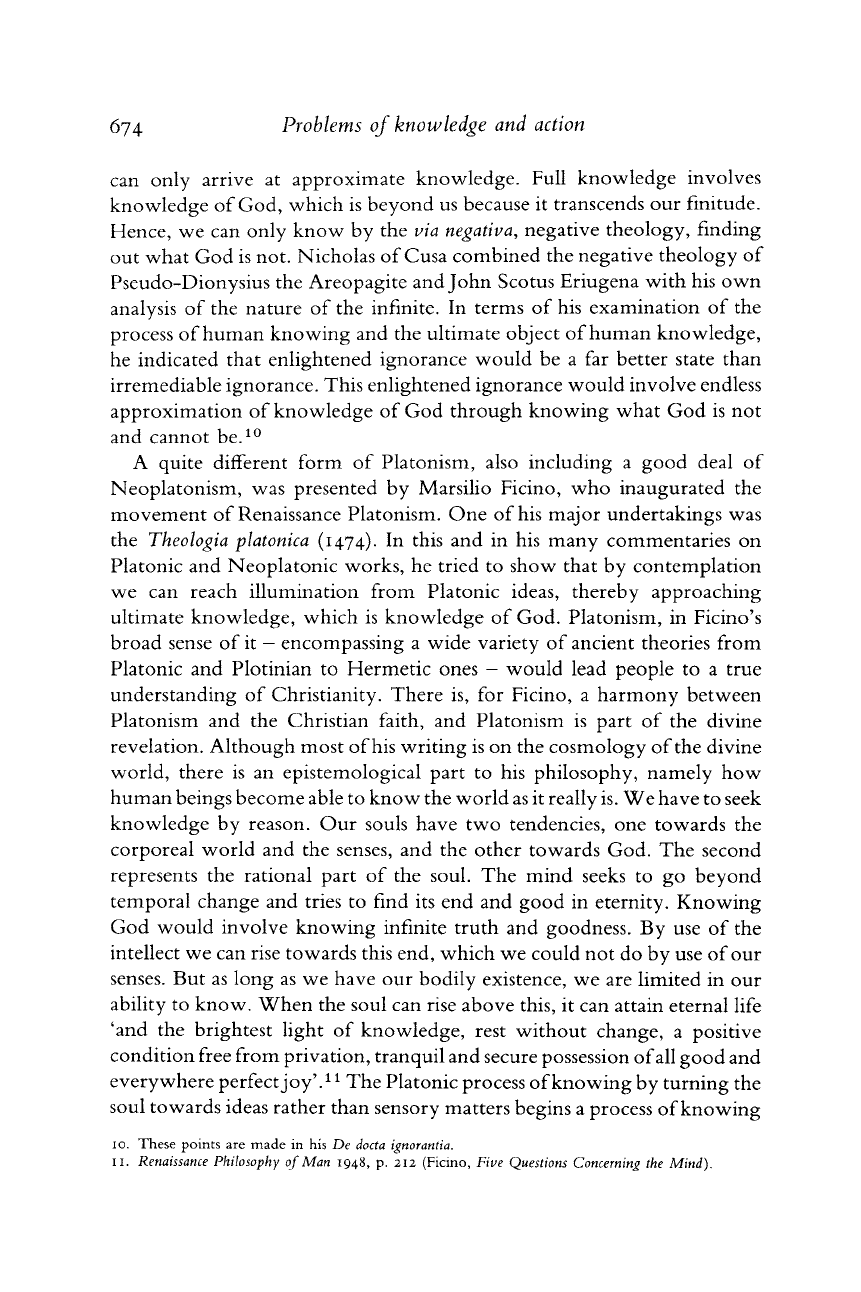
674
Problems of knowledge and action
can only arrive at approximate knowledge. Full knowledge involves
knowledge
of God, which is beyond us because it transcends our fmitude.
Hence, we can only know by the via negativa, negative theology, finding
out what God is not. Nicholas of Cusa combined the negative theology of
Pseudo-Dionysius the Areopagite and
John
Scotus Eriugena with his own
analysis of the
nature
of the infinite. In
terms
of his examination of the
process of human knowing and the ultimate object of human knowledge,
he indicated
that
enlightened ignorance would be a far
better
state
than
irremediable ignorance. This enlightened ignorance would involve endless
approximation of knowledge of God through knowing what God is not
and cannot be.
10
A
quite different form of Platonism, also including a good deal of
Neoplatonism, was presented by Marsilio Ficino, who inaugurated the
movement of Renaissance Platonism. One of his major undertakings was
the Theologia platonica
(1474).
In this and in his many commentaries on
Platonic and Neoplatonic works, he tried to show
that
by contemplation
we
can reach illumination from Platonic ideas, thereby approaching
ultimate knowledge, which is knowledge of God. Platonism, in Ficino's
broad sense of it
—
encompassing a wide variety of ancient theories from
Platonic and Plotinian to Hermetic ones
—
would lead people to a
true
understanding of Christianity. There is, for Ficino, a harmony between
Platonism and the Christian faith, and Platonism is
part
of the divine
revelation. Although most
of
his writing is on the cosmology of the divine
world,
there
is an epistemological
part
to his philosophy, namely how
human beings become able to know the world as it really is. We have to seek
knowledge
by reason. Our souls have two tendencies, one towards the
corporeal world and the senses, and the other towards God. The second
represents the rational
part
of the soul. The mind seeks to go beyond
temporal change and tries to find its end and good in eternity. Knowing
God
would involve knowing infinite
truth
and goodness. By use of the
intellect we can rise towards this end, which we could not do by use of our
senses. But as long as we have our bodily existence, we are limited in our
ability to know. When the soul can rise above this, it can
attain
eternal
life
'and the brightest light of knowledge, rest without change, a positive
condition free from privation, tranquil and secure possession
of
all
good and
everywhere
perfect
joy'.
11
The Platonic process
of
knowing
by
turning
the
soul towards ideas
rather
than
sensory
matters
begins a process
of
knowing
10.
These
points
are
made
in his De docta ignorantia.
11.
Renaissance Philosophy of Man 1948, p. 212
(Ficino,
Five Questions Concerning the Mind).
Cambridge Histories Online © Cambridge University Press, 2008
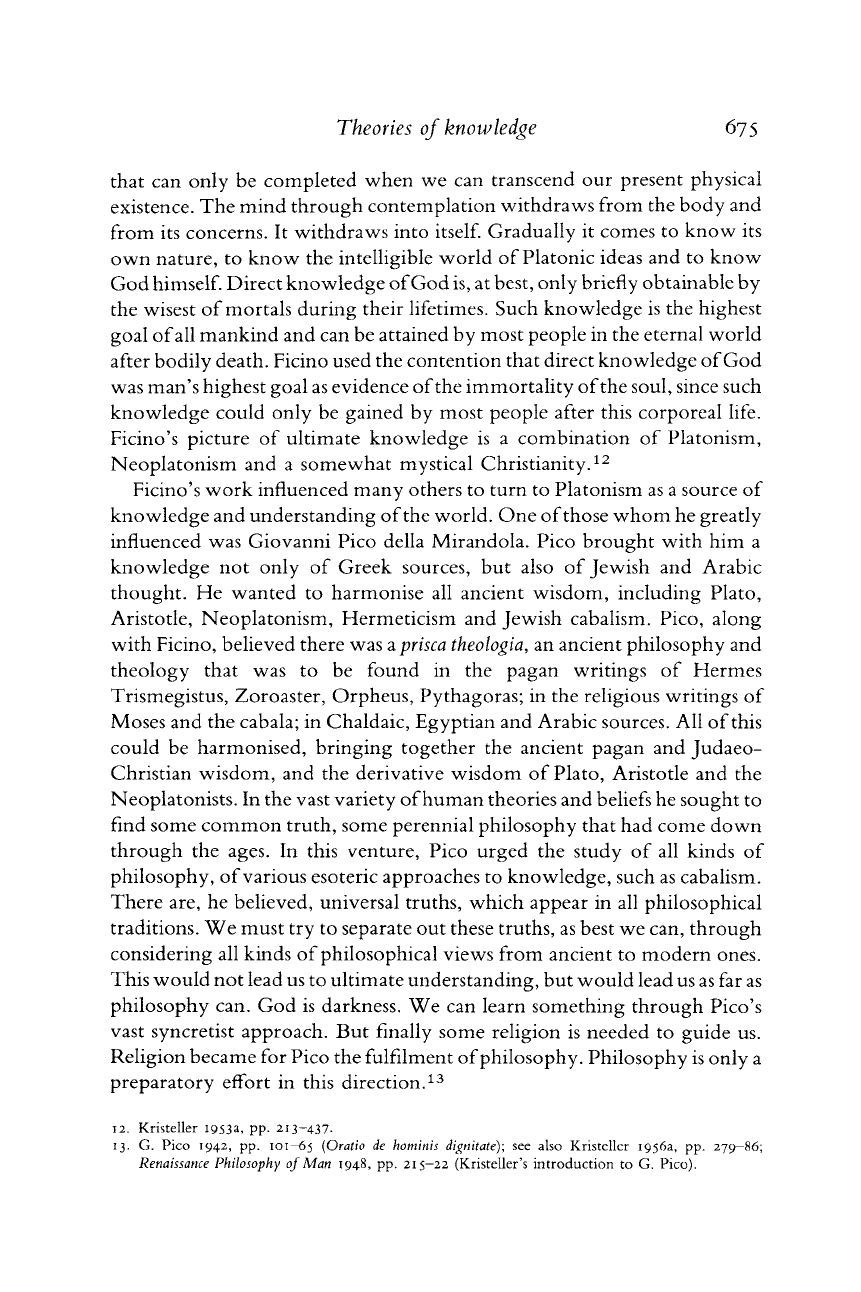
Theories of knowledge
675
that
can only be completed when we can transcend our present physical
existence.
The mind through contemplation withdraws from the body and
from its concerns. It withdraws into itself. Gradually it comes to know its
own
nature,
to know the intelligible world of Platonic ideas and to know
God
himself. Direct knowledge
of
God
is, at best, only briefly obtainable by
the wisest of mortals during their lifetimes. Such knowledge is the highest
goal
of
all
mankind and can be attained by most people in the eternal world
after bodily death. Ficino used the contention
that
direct knowledge
of
God
was
man's highest goal as evidence
of
the immortality
of
the soul, since such
knowledge
could only be gained by most people after this corporeal
life.
Ficino's
picture of ultimate knowledge is a combination of Platonism,
Neoplatonism and a somewhat mystical Christianity.
12
Ficino's
work influenced many others to
turn
to Platonism as a source of
knowledge
and understanding
of
the world. One
of
those whom he greatly
influenced was Giovanni Pico della Mirandola. Pico brought with him a
knowledge
not only of Greek sources, but also of Jewish and Arabic
thought. He wanted to harmonise all ancient wisdom, including Plato,
Aristotle,
Neoplatonism, Hermeticism and Jewish cabalism.
Pico,
along
with
Ficino, believed
there
was aprisca theologia, an ancient philosophy and
theology
that
was to be found in the pagan writings of Hermes
Trismegistus, Zoroaster, Orpheus, Pythagoras; in the religious writings of
Moses
and the cabala; in Chaldaic, Egyptian and Arabic sources. All of this
could
be harmonised, bringing together the ancient pagan and Judaeo-
Christian wisdom, and the derivative wisdom of Plato, Aristotle and the
Neoplatonists. In the vast variety
of
human theories and beliefs he sought to
find some common
truth,
some perennial philosophy
that
had come down
through the ages. In this venture, Pico urged the study of all kinds of
philosophy,
of
various esoteric approaches to knowledge, such as cabalism.
There are, he believed, universal
truths,
which appear in all philosophical
traditions. We must try to separate out these
truths,
as best we can, through
considering all kinds of philosophical
views
from ancient to modern ones.
This
would not lead us to ultimate understanding, but would lead us as far as
philosophy can. God is darkness. We can learn something through Pico's
vast syncretist approach. But finally some religion is needed to guide us.
Religion
became for Pico the fulfilment
of
philosophy. Philosophy is only a
preparatory effort in this direction.
13
12.
Kristeller
1953a,
pp.
213-437.
13.
G.
Pico
1942, pp.
101-65
{Oratio de hominis dignitate); see
also
Kristeller
1956a,
pp.
279-86;
Renaissance Philosophy of Man 1948, pp.
215-22
(Kristeller's
introduction
to G.
Pico).
Cambridge Histories Online © Cambridge University Press, 2008
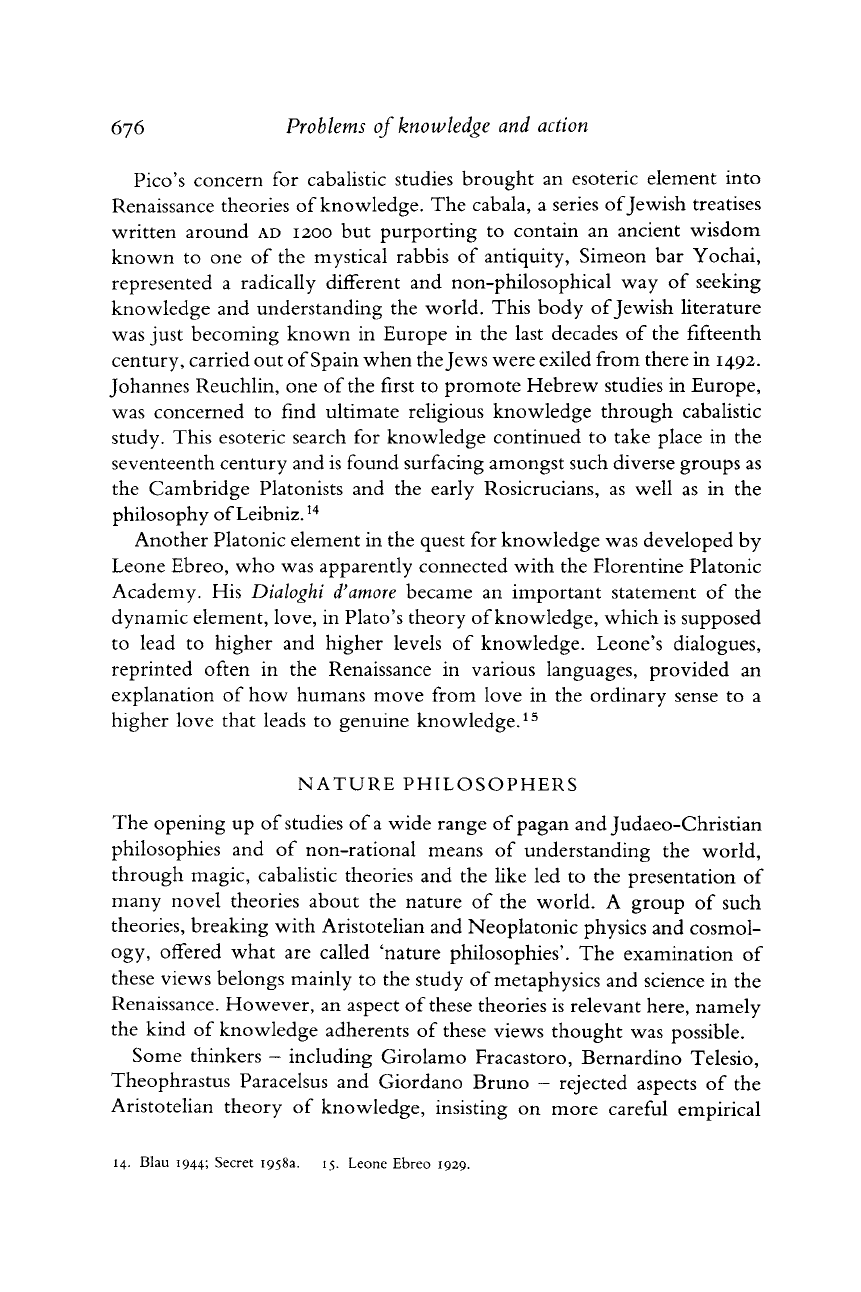
676
Problems
of
knowledge
and
action
Pico's
concern
for
cabalistic studies brought
an
esoteric element into
Renaissance theories
of
knowledge.
The
cabala,
a
series
of
Jewish treatises
written around AD
1200 but
purporting
to
contain
an
ancient wisdom
known
to one of the
mystical rabbis
of
antiquity, Simeon
bar
Yochai,
represented
a
radically different
and
non-philosophical
way of
seeking
knowledge
and
understanding
the
world. This body
of
Jewish
literature
was
just becoming known
in
Europe
in the
last decades
of the
fifteenth
century, carried
out
of
Spain when the Jews were exiled from
there
in
1492.
Johannes
Reuchlin,
one of
the first
to
promote Hebrew studies
in
Europe,
was
concerned
to
find ultimate religious knowledge through cabalistic
study. This esoteric search
for
knowledge continued
to
take place
in the
seventeenth century
and
is found surfacing amongst such diverse groups
as
the Cambridge Platonists
and the
early Rosicrucians,
as
well
as in the
philosophy
of
Leibniz.
14
Another Platonic element
in the
quest
for
knowledge was developed
by
Leone
Ebreo, who was apparently connected with
the
Florentine Platonic
Academy.
His
Dialoghi
d'amore
became
an
important
statement
of the
dynamic element,
love,
in
Plato's theory
of
knowledge,
which
is
supposed
to lead
to
higher
and
higher
levels
of
knowledge. Leone's dialogues,
reprinted
often
in the
Renaissance
in
various languages, provided
an
explanation
of
how humans move from
love
in the
ordinary sense
to a
higher
love
that
leads
to
genuine knowledge.
15
NATURE
PHILOSOPHERS
The
opening
up of
studies
of
a wide range
of
pagan and Judaeo-Christian
philosophies
and of
non-rational means
of
understanding
the
world,
through magic, cabalistic theories
and the
like
led to the
presentation
of
many novel theories about
the
nature
of the
world.
A
group
of
such
theories, breaking with Aristotelian
and
Neoplatonic physics
and
cosmol-
ogy,
offered what
are
called
'nature
philosophies'.
The
examination
of
these
views
belongs mainly
to the
study
of
metaphysics
and
science
in the
Renaissance. However,
an
aspect
of
these theories
is
relevant here, namely
the kind
of
knowledge
adherents
of
these
views
thought
was
possible.
Some
thinkers
-
including Girolamo Fracastoro, Bernardino
Telesio,
Theophrastus Paracelsus
and
Giordano Bruno
-
rejected aspects
of the
Aristotelian theory
of
knowledge, insisting
on
more careful empirical
14.
Blau
1944;
Secret
1958a.
15.
Leone
Ebreo
1929.
Cambridge Histories Online © Cambridge University Press, 2008
